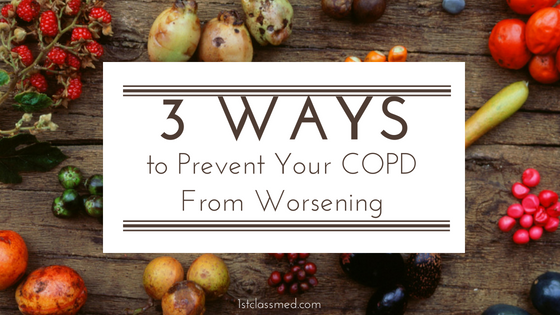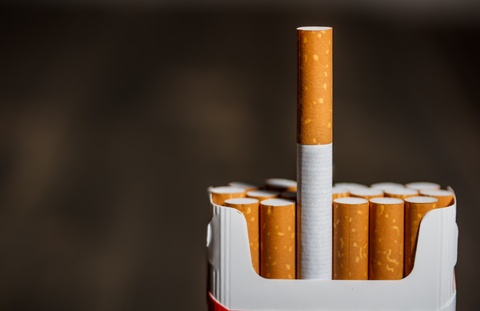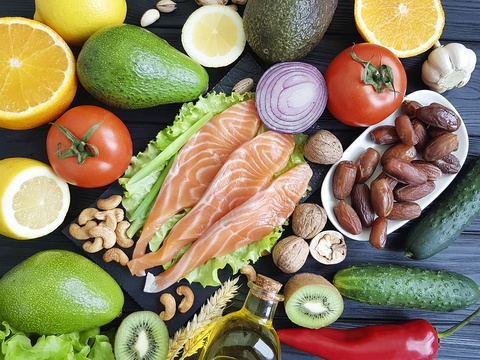
After scrolling through lists telling you that you need to change everything about your lifestyle in order to stop your COPD from worsening, it seems better to give up versus changing your lifestyle.
Having to change every aspect of your daily routine can be a lot to ask of you, as sometimes new things just aren’t comfortable.
There are a few ways to prevent your COPD from worsening, and it is not changing your whole life!
How progressive the disease can get all depends on your level of self-care, but it can be a lot to ask to change every aspect of your life.
Though it can feel like a COPD diagnosis means its terminal, it does not always get worse and there are ways to try and stop it from getting worse.
There are 3 very important things to prevent it from getting worse, and they can be difficult to do, but also can be more beneficial that other minor changes.
Avoid Smoking and Smoke

Common among doctors, the recommendation to quit smoking is one with the most benefits.
Smoking is the cause of 8 out of 10 COPD-related deaths, and yet 39% of COPD patients continue to smoke, in the U.S.
Smoking at a young age can stun the growth of the lungs, and it can then increase the risk of COPD as an adult.
Though smoking can be addictive, cutting it out of your life can change the outcome of your diagnosis dramatically.
Even secondhand smoke can affect your lungs, and also increase your risk of COPD, so avoid anyone smoking tobacco products until they are done.
Staying away from harsh smoke such as tobacco smoke, can make it easier on your lungs and help you feel less out of breath.
Smoke is an irritant to your lungs, damaging them and making it harder on you to breathe or catch your breath.
The smoke can damage the airways as well as the small air sacs in the lungs, making them lose their elasticity.
The walls of the airways become inflamed or destroyed, which can produce more mucus and possible block air flow.
This excess mucus can make you feel like you need to cough more, in turn leaving you out of breath trying to cough up mucus.
This constant cough is called a smoker’s cough, which not only leaves you out of breath, but can exhaust you.
Avoid Pollutants

Avoiding harsh cleaning supplies and staying inside on days of high pollen can make it easier on your COPD.
The strong chemical scent can be too much for those with COPD, as it can be an irritant and make breathing harder.
Finding natural home cleaners or making your own can prevent you from inhaling the harsh chemicals while cleaning.
Cleaning with harsh chemicals can cause a coughing fit, or it can just be very overwhelming and cause a headache.
Pollutants may not make your COPD worse, but they can trigger a flare up and make it harder for you to go about your daily tasks.
Flare ups can make you cough a lot or feel like you cannot breathe, so avoiding triggers is the best way to prevent flare ups.
Forest fires and outdoor smoke can heavily irritate the lungs in COPD patients, so avoiding them important.
Forest fires are hard to avoid, as the smoke can spread over a large area of land and even though it may dissipate it can still trigger a flare up and get into your home.
If you are close enough to a forest fire, it is best to go out of town and stay with a friend or family member for a few days until it clears up.
Or if you are unable to travel far, stay with someone nearby so you are not alone.
Making sure you have someone near you can make you feel more comfortable if you are to get a severe flare up from the smoke.
Bonfires are also possible triggers for COPD patients, as sitting close to the fire can be very risky.
Though it can be fun to sit around a bonfire and make smores, being that close to a fire means a higher concentration of smoke.
That high concentration can make it easier to trigger a flare up, which is a risk for COPD patients.
Drinking Water and Being Healthy

Making sure to give your body all the nutrients it needs is another important way to prevent your COPD from getting worse.
Staying hydrated and eating healthy meals can make breathing easier for you.
Many with COPD find complications when it comes to eating, as they get too tired before they are able to finish their meals.
Focusing on healthy foods and water when you do eat is very important.
Consuming fattening foods can make it harder to breathe, as gaining weight puts more responsibility on the heart and lungs.
Fattening foods can also fill up your stomach with non-nutritional foods and will make you more tired when you eat meals.
Though eating can seem like a daunting task, eating more, smaller meals in a day can be easier than eating a few big meals during the day.
This can allow you to feel less out of breath than you would when eating a few large meals during the day.
You can also practice resting before and after meals by resting after you cooked and before you eat, as well as after you eat and before you clean up.
By doing this, you can feel less overwhelmed around meal time, and can enjoy your food.
Last Resort
Though you can do what you can to prevent your COPD from worsening, sometimes it continues to progress anyways.
There are a few ways doctors can get involved to prevent COPD from getting to its absolute worst.
Surgery is more of a “last ditch” effort when medications and other treatments haven’t helped.
LVRS (lung volume reduction surgery) removes part of the damaged lung to allow the healthy tissue and lung to work better, the damaged area can prevent the healthy tissue from working at its best.
A lung transplant is also a last effort for those with did not respond well to medications and treatments.
Lung transplant surgery is when one or both lungs are replaced with healthy donor lungs, this can allow the lungs to work effectively again, but it can be hard to find donor lungs.
Conclusion
Though it can be difficult to quit smoking, or not worry about environmental pollutants, it is important to your health and the severity of your COPD to take care of yourself.
Chemical cleaning products and outside smoke are both still harmful to your COPD, though they may not worsen your COPD like smoking, they can trigger flare ups.
By consuming healthy foods and drinking water, you can make sure your body is getting the rights foods when you do eat.
Self-care is the most important part of your treatment, as it can be the most successful to follow your doctor’s recommendations.
If your doctor recommends a couple different things, it may be best to follow those instructions, as he/she knows your medical history best.



